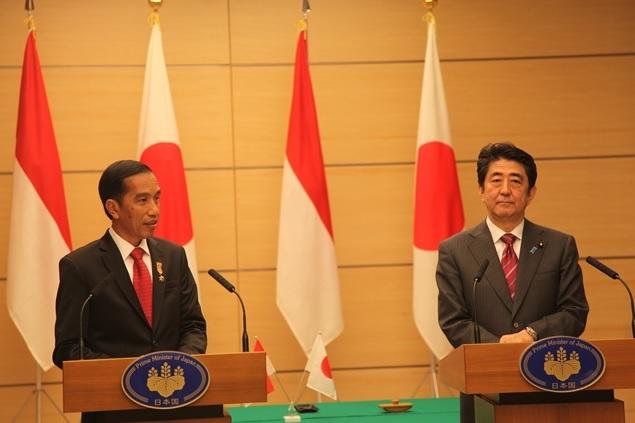Last week, Indonesia’s President Joko Widodo embarked on a weeklong Northeast Asian tour beginning with Tokyo on Monday and then Beijing on Wednesday. Besides pressing the flesh and riding a bullet train, Jokowi’s aims were to attract greater investment in Indonesia and strengthen political ties. Among the pledges and promises, let’s see what major stuff Jokowi took home.
Strategic partnership
In Tokyo, Jokowi received positive statements from Prime Minister Abe that both countries would ‘enhance’ their strategic partnership and build security cooperation via 2+2 meetings. They signed a memorandum on further bilateral defence cooperation that included increased military training—beyond the existing exchange of military students—and access to military technology to help Japan gain foothold in Indonesian defence industry given the competitiveness of South Korean firms in the region.
In Beijing, Jokowi and Xi Jinping agreed to sign a five-year plan of action to build on the comprehensive strategic partnership, as well as an MoU on cooperation in preventing and combatting transnational crime. Both sides agreed to further expand defence cooperation in the areas of joint exercises and training, and to further establish army to army and air force to air force talks, alongside the existing navy dialogue. Interestingly, given Indonesian sensitivities about intrusions into its maritime domain, the joint statement included the following reference:
The Indonesian side is ready to continue providing facilitation for Chinese vessels to carry out telemetry, tracking and control missions in Indonesian waters in accordance with the Indonesian national laws and bilateral agreements.
Maritime cooperation
The Jokowi administration’s policy centrepiece is to transform Indonesia into a ‘global maritime nexus’. No surprises then that maritime cooperation featured heavily in the Japan–Indonesia joint statement, with both Jokowi and Abe affirming the importance of ‘free, open and stable seas’ for peace, prosperity and security. The main takeaway was the agreement to launch a Japan–Indonesia Maritime Forum as soon as possible to further strengthen and accelerate maritime cooperation, including maritime safety and security, as well as the promotion of maritime industries. Japan will also enhance the competence of Indonesia’s coast guard and develop infrastructure. But exact details are still lacking, as The Diplomat’s Prashanth Parameswaran notes.
Although the China–Indonesia statement appeared lighter on maritime matters, it was no less significant. For one, it pledged cooperation in a number of maritime-related areas as part of developing a maritime partnership. Xi Jinping also promised to support investment in Indonesia’s maritime infrastructure as well, via the Asian Infrastructure Investment Bank (AIIB) and the Silk Road Fund. Both sides also signed a MoU on maritime search and rescue.
Investment
Foreign investment will play a key role in realising many of the President’s plans, such as boosting maritime infrastructure. Jokowi’s APEC speech in November had a clear message: ‘we are waiting for you to invest in Indonesia’.
In Tokyo, Jokowi secured Abe’s support for an economic program called ‘Promosi’ (Indonesian for ‘promotion’), designed to boost Japanese investment in the country, particularly in energy, transport and infrastructure. Abe also promised 140 billion yen (A$1.5 billion) in loans for railway projects, including Indonesia’s rapid transit system currently under construction. Jokowi was treated to a bullet train ride as part of the Japanese sales pitch for the technology, and a feasibility study is already underway.
Meanwhile, Jokowi secured similar deals and affirmations in Beijing, including an MoU on cooperating on a high speed rail project linking the capital and Bandung, another major Indonesian city, as well as energy and infrastructure cooperation including toll roads throughout the archipelago, dams and deep-sea ports.
China’s PM Li Keqiang labelled economic cooperation between the two nations as ‘win-win cooperation’, encouraging Chinese companies to consider Indonesia as an investment destination.
A win for Jokowi?
In contrast with his predecessor, Susilo Bambang Yudhoyono, Jokowi’s foreign policy is more pragmatic and economically focussed. Jokowi has done well to leverage the maritime domain for Indonesia to build better investment and security ties with Japan and China. The statements and agreements signed with both Northeast Asian partners will help boost trade and investment with Southeast Asia’s largest economy. As many of Jokowi’s ambitions for his country are contingent on maintaining economic growth and investment, it remains to be seen what role Japanese and Chinese money can play. Suffice to say, however, every little bit counts (according to the World Bank, FDI in Indonesia in 2013 was worth US$23 billion).
With Japan and China both vying for influence in Southeast Asia, the trip had gains for both. While Indonesia mightn’t be a claimant in maritime disputes with China, its position on maintaining stability in the maritime domain and respecting international law align with Japan’s interests. From Japan’s perspective, that’s a win.
Indonesia has also been careful not to antagonise China. Although ahead of his Tokyo trip Jokowi declared that China’s nine-dash line had no basis in international law, he dodged controversy by clarifying his position and reiterating Jakarta’s desire to be an ‘honest broker’ in maritime disputes.
This trip saw Jokowi’s first bilateral visits outside ASEAN, underlining the increasingly important role China and Japan will play in Indonesia’s and Southeast Asia’s future. Against a backdrop of increased Chinese assertiveness in the South China Sea and tensions between China and Japan, harnessing both countries (or even playing them off against one another) will be a neat trick—if Jokowi pulls it off.
